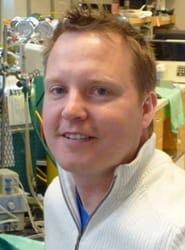Peter MacFarlane, PhD

Peter MacFarlane, PhD
Dr. MacFarlane, assistant professor of neonatology, is from Melbourne, Australia. His research interests focus on the neurobiology of breathing, lung development and airway reactivity, with a translational interest in apnea of prematurity, sudden infant death syndrome and the effects of neonatal CPAP on lung development. He has mentored a number of fellows and residents.
Bio
The research interest of his laboratory focuses on understanding how the neurobiology of breathing is modified by early life experiences, particularly related to clinical scenarios commonly experienced by preterm infants. Ongoing studies/disciplines in his laboratory relate to understanding the pathophysiological consequences of apnea of prematurity (chronic intermittent hypoxia), supplemental oxygen therapy (hyperoxia), antenatal inflammation (amnionitis), neonatal inflammation (sepsis), and continuous oxygen de-saturation (sustained hypoxia). Much of the research in his laboratory encompasses understanding: 1) the etiology of sudden infant death syndrome; 2) dietary (metabolism and nutrition) regulation of genes important for respiratory neural development; and 3) airway hyper-reactivity and pulmonary development following neonatal hyperoxia and continuous positive airway pressure (CPAP). He has a particular interest in the neurochemistry of breathing and its interaction with inflammatory stimuli during particularly vulnerable windows of development. The overall hypothesis driving his research is that early life experiences, particularly during uniquely vulnerable periods of development, may underlie various forms of respiratory morbidities later in life. His lab hopes that an understanding of the interactions between these early life experiences and the developing respiratory control system may help to refine current treatment, or guide the development of new therapeutic interventions used in the care of (particular preterm) infants.
His laboratory fosters and mentors Neonatology Fellows and Residents, Graduate, and Summer Undergraduate students (via SURP). Enthusiastic students/trainees should direct emails to Dr. Peter MacFarlane (Ph.D.)


